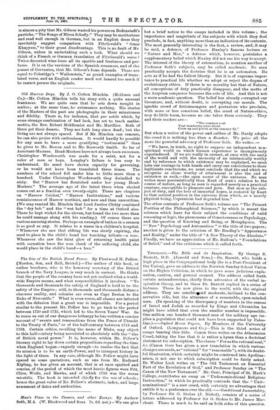Man's Place in the Cosmos, and other Essays. By Andrew
Seth, M.A. (W. Blackwood and Sons. 7s. 6d. net.)—We can give but a brief notice to the essays included in this volume ; the importance and magnitude of the subjects with which they deal preclude, in fact, anything more than an indication of its contents. The most generally interesting is the first, a review, and, it may be said, a defence, of Professor Huxley's famous lecture on " Nature and Man," a defence which, however, postulates a supplementary belief which Huxley did not see his way to accept. The interest of the theory of automatism, to mention another of Professor Seth's subjects, may be called academic. No man practically accepts the doctrine that he is an automaton. He acts as if he had the fullest liberty. But it is of supreme impor- tance to practical life whether we adopt or reject the dogma of evolutionary ethics. If there is no morality but that of Nature, all conceptions of duty practically disappear, and the motto of the Assyrian conqueror becomes the rule of life. And this is not a mere academic question. The belief has already corrupted our literature, and, without doubt, is corrupting our morals. The ignoble crowd of fictionmongers and poetasters who proclaim, with more or less conscious belief, the creed of Nature-ethics, may do little harm, because no one takes them seriously. They and their readers are—
"The common rout That wandering loose about Grow up and perish as the summer fly."
But when a writer of the power and calibre of Mr. Hardy adopts the creed it is nothing less than a disaster. We prize all the more the powerful advocacy of Professor Seth. He writes :- " We have, in truth, no right to suppose an independent non- spiritual world on which human experience is incongruously superinduced. If we are really in earnest, at once with the unity of the world and with the necessity of an intrinsically worthy end by reference to which existence may be explained, we must take our courage in both hands and carry our convictions to their legitimate conclusions, we must conclude that the end which we recognise as alone worthy of attainment is also the end of existence as such.—the open secret of the universe. No man writes more pessimistically than Kant of man's relation to the course of nature, as long as man is regarded merely as a practical creature, susceptible to pleasure and pain. But man as the sub- ject of duty, and the heir of immortal hopes, is restored by Kant to that central position in the universe from which, as a merely physical being, Copernicus had degraded him."
The other contents of Professor Seth's volume are " The Present Position of the Philosophical Sciences," by which is meant the sciences which have for their subject the conditions of valid reasoning or logic, the phenomena of Consciousness or Psychology, and the question of Knowing and Being, or Metaphysics. The " New' Psychology and Automatism " is the title of two papers ; another is given to the criticism of Mr. Bradley's "Appearance and Reality," under the title of "A New Theory of the Absolute." Finally, we have an appreciation of Mr. Balfour's " Foundations of Belief." and of the criticisms which it called forth.


















































 Previous page
Previous page